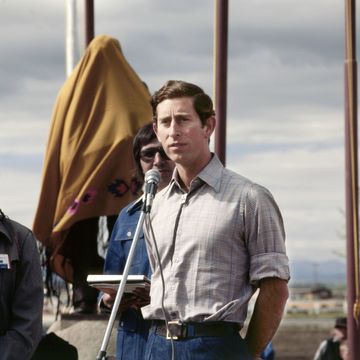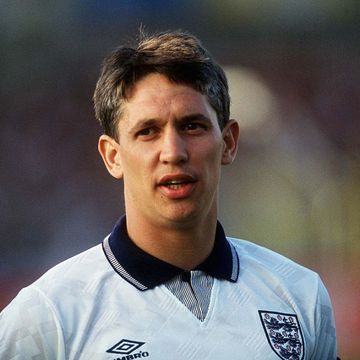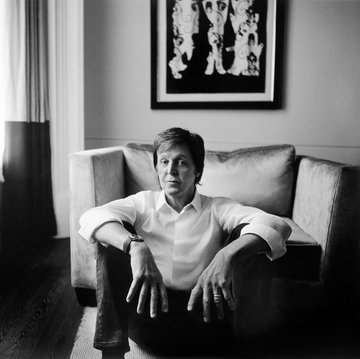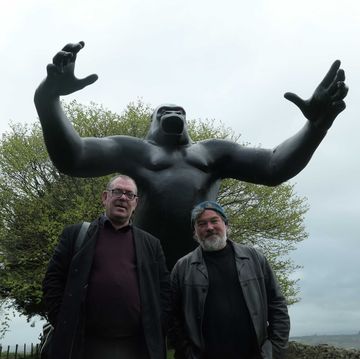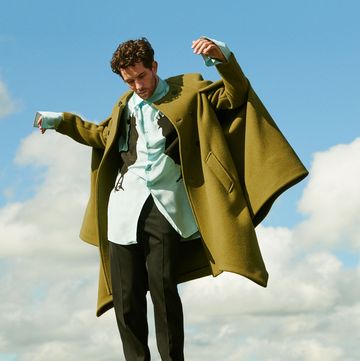"Ignominious" is the word he uses.
It is difficult not to present Henry Marsh's career in a heroic light. He has a renaissance spirit: an irrepressible energy and curiosity that 500 years ago would have seen him mapping a new continent in the morning and sketching a helicopter after lunch. He has spent most of the past four decades as a neurosurgeon, a trade sometimes compared in medical circles to bomb-disposal work. He is the pioneer in Britain of awake craniotomy, a surreal, seemingly high-wire technique in which a brain tumour known as a low-grade glioma is sucked out while the patient sits there chatting to the anaesthetist. When Marsh was not working in south London, he spent every spare moment operating in, his word, some of the most "dysfunctional" places on earth: Ukraine, Albania, Nepal.
Perhaps the 67-year-old Marsh's greatest legacy, though, is his ability to communicate the pressures and exhilaration of his legendarily byzantine profession — it is brain surgery, after all — to a wider public. A feature-length 2007 documentary on his work in Ukraine, The English Surgeon, won an Emmy. The first instalment of his memoir, Do No Harm: Stories of Life, Death and Brain Surgery, published in 2014, sold a quarter of a million copies in this country and became a global bestseller. Ian McEwan called Marsh "neurosurgery's Boswell". The follow-up, Admissions: a Life in Brain Surgery is equally enthralling.
But if a grand career deserves a fanfare ending, Marsh didn't get one. Two weeks before he retired as senior consultant at St George's Hospital in Tooting in 2014, Marsh was called to operate on a bloated brain tumour in a patient called Peter. The tumour was growing in the foramen magnum ("the great hole") at the base of the skull and it was trapping spinal fluid in Peter's head, causing intense headaches. "I've seen many bigger," he told Peter truthfully while looking at the brain scan, though he knew it didn't sound very reassuring. Without treatment, Peter would be dead in a few weeks; he had a wife and two children, aged eight and six.
As Marsh cycled to work on the morning of the operation, he felt sick to his stomach, as he always did. When Peter dropped off under anesthetic, Marsh imagined his soul leaving his body. All that was left now, under sterile sheets, wadded with layers of gauze, was an empty vessel, with a portal leading down to Peter's brain. The view, taken in through a microscope, was both savage and stunning: a landscape of rivers and glaciers in vivid reds and purples like a Richard Mosse photograph.
The start of the operation, any operation, was always accompanied by an adrenaline surge. Marsh considers surgery to be nothing less than "an addiction". Even when he performs procedures that he has repeated hundreds of times, with the unthinking familiarity of tying his bootlaces, he gets a spike in his concentration and energy levels. It's for this reason that Marsh, who as a junior doctor would clock 120-hour weeks, says that he would always choose a tired but experienced surgeon over a well-rested but less practised one.
As the surgery progressed, Peter experienced major blood loss; as it gushed relentlessly upwards, Marsh was concerned momentarily that he would exsanguinate (bleed to death). The operation was more than four hours of tiny, deft movements and intense focus. Marsh should have asked for help from a colleague, but surgeons tend to be proud, self-important people and Marsh is no different. In fact, on the verge of retirement, in his mid-sixties, he was worse. Eventually, the bleeding was under control and the tumour pretty well removed.
So a success. Death or a major stroke had been averted; Peter's headaches would soon be gone. He should get to see his children grow up. But it's what happened next that haunts Marsh. The morning after the operation, Marsh went to see Peter in the intensive care unit. Overnight, a doctor had inserted a nasogastric tube to feed Peter. It was a petty issue, but Marsh didn't think he needed it and asked the duty nurse to remove the tube. The nurse said he couldn't and wouldn't until given an official nod. The row went back and forth. Finally, 34 years of frustration — fury at the decline of the NHS and the effective castration of senior surgeons, the silverbacks of the hospital world — erupted within Marsh.
He lent in, grabbed the nurse's nose between his thumb and index finger and gave it an almighty tweak. "I hate your guts!" he flounced. In the following days, there would be apologies, a threat of disciplinary action, a slap on the wrist. As a way to bow out, like Marsh says, "ignominious".
Although Marsh admits, "I threw my toys out of the pram", he insists he has no regrets about retiring from the NHS. But the decision has created considerable psychic upheaval for him. Not least, what the hell is he going to do next? He is in vigorous fettle: every morning, he endures a routine of running and press-ups that culminates with an icy-cold shower. Mentally, he's as sharp as a tack. "The problem with retirement," says Marsh, as we sit together in his kitchen in Wimbledon, south-west London, "is that now I've months ahead and I know that death is at the end of it."
You'd probably have to classify Marsh not as a pessimist but certainly an unblinking realist. A long career of staring intently at brains — and specifically the effect of frontal-lobe damage to an individual's moral and social nature — has disavowed him of any hope for life after death or an immortal soul. This, sorry to say, is it: "Dead is dead," he concludes.
If you have read Do No Harm already, then the nose-tweaking story will not come as a surprise. It is common, maybe even legitimate, to depict neurosurgeons as a rung below deities: Henry Perowne, the lead character in Ian McEwan's 2005 novel Saturday, appears to the relatives of patients "like a god, an angel with the glad tidings — life, not death". But Marsh defiantly swerves that status. While it is true that he often holds the fates of patients in his hands, he thinks the idea of the detached neurosurgeon with a divine control over the outcomes of his operations is absurd.
And, in Marsh's telling, events invariably don't go to plan. The crux of The English Surgeon is the story of Tanya, a young Ukrainian girl whose tumour was the largest Marsh had ever seen. He operated on her once for 10 hours, then again for 12 hours, paid for her personally to come to London for treatment, but couldn't save her. In the film, he is visibly shaken and travels to Ukraine to visit her mother, Katya, almost as a penance. In Do No Harm, he reveals how he actually suggested that the relatives of one patient sue him because of a mistake he'd made. Afterwards, "crazily enough", they became friends.
Marsh's career could be summed up by a lecture he gave to a group of American neurosurgeons. It was titled "All My Worst Mistakes". When he finished, the audience was silent, either in shock at his ineptitude or his candidness. "It's kind of funny," says Marsh, "you become famous for saying you're not very good."
My meeting with Marsh feels more like a tutorial at an Oxford college than an interview. He is a natty dresser: he wears bold, round spectacles for his severe short-sightedness and high brogue boots polished every morning to a soldier's shine. He's handsome but it's hard to say exactly why; one suspects he's got better looking with age. His hooded eyes twinkle one second, look downcast the next. Periodically, Marsh gazes out to his garden, to his three beehives, and beyond to his workshop, where he spends every spare moment. It's mid-March and the room is freezing: there's an open hearth but the fire is effectively decorative. I expect Marsh to toss a cricket ball at me any moment, just to test my reflexes.
Instead, he throws a log on the embers and continues, "Most people remember me talking about my failures — there are some triumphs in the books as well, but they are kind of overwhelmed by the disasters. There's two points: one, I could only have written that book towards the end of my career; and second, it's a double-sided truth but you have to be pretty self-confident to admit to failure in a funny sort of way. In a sense it's a sort of arrogance. You've got to be not exactly pleased with yourself, but self-confident."
Marsh is absolutely right. When he describes performing an operation to relieve a trapped nerve in a patient's arm on the wrong side, it is comic; the man, a kitchen fitter by trade, was remarkably sanguine when told, saying he'd made similar mistakes in his own work. Some outcomes are more devastating: it's hard to forget Marsh's description of a young girl with long red hair who died in the operating theatre from loss of blood, a rare occurrence. This happened early in his career, and became a headstone in "the small cemetery" — in the words of the French physician René Leriche whom Marsh often quotes — which all surgeons carry somewhere within themselves.
Yet, at the same time, something about Marsh instills absolute confidence. If, God forbid, you or a loved one needed brain surgery, you'd want him looking down the microscope. He considers himself a "good" surgeon, not a "great" one, but he thinks the great surgeons are overrated, because they often suffer from hubris. "I like to say, teasingly, that success is bad for us," smiles Marsh. "Success corrupts us. Success makes us complacent."
Marsh has been profoundly influenced by the work of Daniel Kahneman, a psychologist and winner of the Nobel Prize in Economics (not bad going for a man who's not even an economist). Kahneman's research has concentrated on human behaviour and explicitly on why we make mistakes. "I met him once, which was a great honour, but the man is pathologically diffident and self-critical," says Marsh. "And I like that. It's like operating: if you go into theatre thinking only about the bad things, you can't operate. But it's critical when doing dangerous surgery, you're always thinking about what might go wrong, always thinking about what's the next bit of anatomy I might hit. So, it's this balance between surging positively forward but being endlessly self-critical. And careful. And in remembering your mistakes and learning from them."
These competing traits make for an odd conversation at times: Marsh can be both self-effacing and boastful, sometimes in the same sentence. At one point he talks of "disconcertingly large" royalty cheques that are now coming in from American book sales like he might be embarrassed of this fact, which clearly he isn't. Or that somehow he feels he doesn't deserve the acclaim, which I don't believe for one second. He snickers, "Bearing in mind I've had psychotherapy in the past."
Where, then, does Marsh's innate self-confidence come from? He thinks for a moment, drains an espresso, "My wife Kate always gets very angry with me: 'It's so unfair, it's all your public school education…' And there is an element of that, at a school like Westminster, you come out entitled. So she's very jealous of that. And I think also my parents did instill me with a strong feeling that I'm special."
Marsh's upbringing was both deeply conventional and a little bit alternative. He was born in 1950, the fourth and final child of Norman Marsh and Christel Christinnecke. Norman was an eminent lawyer and Oxford don who interrogated high-ranking German prisoners of war for military intelligence; he met Christel, who had been ostracised for her anti-Nazi views, in Germany in the Thirties and brought her to England a few weeks before the outbreak of World War II. Together they had significant roles in the creation of Amnesty International from the Sixties onwards. "Whatever good is in me came from them," Marsh writes in Admissions.
Marsh was a smart but troubled child. He has a distinct memory of standing, aged 14, in the waves on Hastings Beach: "For some reason, I thought about killing myself," he recalls. "I was terribly preoccupied by death and in many ways I became a doctor because of this preoccupation. It was awareness of my own awareness, awareness of mortality." He contemplated self-harm again when he was 21 after a misjudged infatuation with an older woman, a family friend, came to nothing. He determined to put his hand through a window, but something held him back. Later on, he would assist on an operation in which a man, in a drunken pique, did exactly that: his hand was left permanently paralysed.
At the time of his unrequited infatuation, Marsh was studying politics, philosophy and economics at Oxford. He abandoned his studies — temporarily it turned out — to move to a mining town north of Newcastle and spent six months as a porter in an operating theatre. He felt at the time that he was emulating Jack Nicholson's character in the 1970 movie Five Easy Pieces (who rejects a privileged upbringing as a pianist and slums it on an oilfield in California), but he realises now he was close to losing the plot. Not long after, he would have a short stint as a patient on a psychiatric ward. But all this led Marsh into medicine, and then into neurosurgery. The first time he saw an aneurysm being clipped, he was smitten. "It was," he often remembers, "love at first sight."
Marsh admits he probably wouldn't take the same decision today. He believes the NHS is in crisis: it was in the red to the tune of £2.45bn in 2016 and Britain now spends less on healthcare than other European countries with similar GDPs. If we want first-class treatment, he believes, we need a new tax, but our political parties are terrified to propose that to voters. Surgeons, meanwhile, are far removed from the swashbuckling iconoclasts they once were. They are more likely to be tied up in meetings, suffocated in red tape, than actually operating on patients.
This said, Marsh would always tell junior colleagues that there are two great benefits to a career in medicine. The first is that if you or someone in your family falls ill, you will always know where to find the best care. Marsh has had good reason to be grateful for this. When his son, William, was three months old, he underwent surgery to remove a brain tumour. Marsh, who had only been qualified as a doctor for four months, could only watch as a surgeon at Great Ormond Street saved William's life. In addition, both his first wife and one of his daughters are profoundly deaf; his second wife, the anthropologist and author Kate Fox, suffers from Crohn's disease, an inflammation of the gut, and has come close to dying. It is customary to "pay" for these services in wine.
"All these are actually invaluable experiences to try to see things from the patient's point of view," Marsh reflects. "As I said in my first book: doctors can't suffer enough."
The second reward of becoming a doctor is the steady supply of anecdotes. Some are horrific, others hilarious. Marsh had always kept a diary when he was growing up, but he started again, on the suggestion of the psychiatrist he was seeing, when his first marriage began to unravel. He recorded the emotional turmoil he was experiencing, but increasingly he would write about individuals he was meeting and how their cases progressed. These entries would form the basis of Do No Harm and now of Admissions.
"I've been terribly lucky because I went through a classic, non-scientific, upper-middle class, private education in the Fifties and Sixties, when I was taught to write all the time," says Marsh. "But most doctors have no education at all, they do science A-levels, everything is multiple choice, they don't probably read very much in my experience and, you know, writing is a skill. You become a good writer by reading and writing.
"My wife gets very cross with me," he goes on. "She says, 'Henry, you talk as if you're the only intellectual, sensitive doctor in the world.' But I don't want to create that impression." Marsh's success has, in fact, created a whole new literary genre: surgeons' memoirs or, as he calls them, "me toos".
Does Marsh think he's unusual? "Am I unusual? I don't think I am unusual particularly in all the emotional ups and downs I've had as a surgeon. Most doctors suffer a lot when patients do badly. I'm unusual in being willing to admit to it publicly. And I'm unusual in being able to write about it articulately. But in terms of the fundamental feelings, no, I think that's common to most doctors. Yes, there are a few psychopaths around. I know one or two surgeons who definitely have a psychopathic tendency, but people become surgeons for excitement. You don't become a surgeon out of some rational, detached wish to help humanity."
He laughs, "I would assume that the one thing all surgeons have in common — but more so in the case of neurosurgeons — is that you find risk attractive. I mean, people wouldn't climb Mount Everest if it was safe. And you wouldn't go into surgery if you didn't… I don't even like the sight of blood. I'm quite squeamish, but I do like operating."
Marsh, of course, is a bit unusual, but brilliantly so. He's an oversharer and raucously entertaining with it. Within three minutes of meeting him, he is telling me about the end of his first marriage. His Victorian terraced house, which he moved into 18 years ago, after the divorce, is full of eccentric touches, many of them handmade in his workshop. He converted the loft himself, dragging hefty steel beams up the stairs, with the help of son William, now in his thirties, to support the new roof. "You have these braces to support the ceiling and then you knock them out with a sledgehammer and see what happens," he tells me, as he gives me the tour. "In retrospect it was completely mad."
Not long ago, Marsh — who also shares a pair of apartments with Fox on Folly Bridge in Oxford — brought in an estate agent to value the property. "He got very excited about it because it was all so quirky," says Marsh. But then he couldn't bear the thought of a new owner coming in and tearing down his handiwork, so he decided not to sell.
Admissions, really, is a book about death. On page one, Marsh writes of his suicide kit: a collection of drugs acquired over the years in case he is faced by dementia or an incurable illness. It's his "most precious possession" he writes, presumably semi-seriously. "Whether I'd use it…" Marsh says now, trailing off. "When push comes to shove, we behave differently to how we think."
But if that makes the book sound gloomy, it's not. To put it another way, Marsh is fixated on how best to use his time on earth. "I have this almost pathological need to feel useful," he says. He still has teaching commitments at St George's Hospital, and continues to do major operations abroad: last year he made 28 trips to 20 countries. Often when he's in Nepal or Ukraine, he feels more like a vet than a surgeon, the conditions are so primitive. What's the appeal then? "It's quite hard to answer," he replies. "I'm certainly no fucking Christian missionary. It's partly my family background, my parents, Amnesty International. Making the world a better place was kind of part of my upbringing."
We're in Marsh's workshop now. The entrance is flanked by twin red pillars, inspired by a visit he paid to the Forbidden City in Beijing. Inside is every tool under the sun: Japanese chisels, German bow saws, three lathes, a radial arm saw, a bandsaw, something called a spindle moulder. Everything you need to work wood, metal, carve stone. It is a deep and genuine sadness to Marsh that he has no justifiable need to add to his collection. All he can do now is sit up in bed and read "tool porn" — machinery catalogues — much to the derision of his wife. Between some clamps rests an ornamental radiator cover he is making for Fox. "All men need sheds," Marsh decides. "It's very important for a successful marriage.
"Although making things clutters up the world with unnecessary stuff, it's wonderful psychotherapy," he says, running his hand over a newly planed edge. "Everybody ought to do it."
Marsh has recently dipped his toe in the murky waters of politics, joining the woebegone Liberal Democrats, the party he believes has the most practical strategy for financing the NHS. "They're in a hopeless situation," he concedes, "but if they'd like to take advantage of my minor celebrity for the Lib Dems' health policy, I'd be happy to oblige.
"I need to do something and, as a doctor, you automatically have good credibility: you're a Good Man, with a capital 'G' and 'M'. Although I think Prince Charles is a bit of a twit, nevertheless he's trying to make use of his position to make the world a better place and I respect him for that. Things like the Prince's Trust… as much as one might laugh at the man," he says. "So, I feel some obligation, but I haven't yet quite found my niche to fill or replace medicine."
Marsh gives the impression of being not quite lost but searching. Even, for the moment, unfulfilled. On the verge of retirement, he bought a decrepit lock-keeper's cottage in Oxford. The plan was that, in his dotage, he would renovate it. Now, however, he's not convinced the project would be the best use of his time and efforts. "Looking back on your life you want to die without regrets," he says, contemplating the bevel of a Japanese chisel. "The point about death is how we live now."
Admissions: a Life in Brain Surgery (Orion) by Henry Marsh is out now
Portrait by Jooney Woodward




